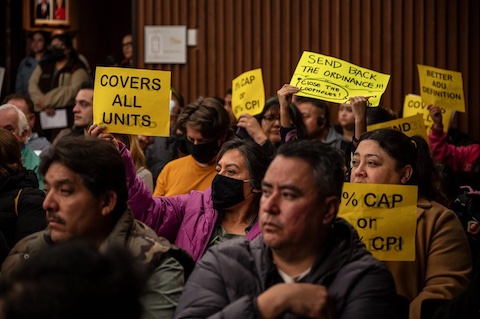
05 Jun Concord’s Rent Stabilization Survives Another Challenge

Tenant advocates hold a signs supporting a proposed 3% rent increase cap or a cap at 60% of the consumer price index at a Concord City Council public hearing on Dec. 12, 2023.
Story by Cassandra Garibay, El Timpano | Photo credit: Hiram Alejandro Durán for El Tímpano/CatchLight Local/Report for America corps member
Concord’s rent stabilization and just cause eviction protections remain in place after yet another challenge last month to the recently enacted ordinance.
The long-fought battle was a victory for tenants who advocated for change for nearly a decade. The ordinance will protect tenants from displacement, but broader changes are needed to remedy the housing crisis that’s affecting Concord and the rest of California.
The push for tenant protections has been eight years in the making and involved months of back and forth before officially passing in a 4-1 vote in March. The protections were initially slated to go into effect April 4, but a petition to put the issue on the November ballot — which ultimately failed to garner enough signatures — delayed the implementation to April 19.
Less than a month after new tenant protections in Concord went into effect, the ordinance was brought back to City Council to consider the removal of just cause protections for single-family homes and condominiums.
On May 14, a motion to remove just cause eviction projections for single-family homes and condominiums failed in a 2-3 vote. While the city does not yet collect data on single-family home rentals, the Anti-Eviction Mapping Project and city officials estimate that single-family homes make up roughly 33% of Concord’s rental housing.
Under the ordinance, rent increases for multi-family homes built before 1995 are capped at 3% or 60% of the consumer price index. The ordinance also requires landlords roll back rent to April 2023 prices with the allowance of a 2.52% increase from that starting point.
Betty Gabaldon, a tenant organizer for East Bay Alliance for Sustainable Economy and the founder of the Todos Santos Tenants Union, said she hopes the protections will allow renters to stay in their communities — something that was not previously afforded to her.
Gabaldon initially moved to Concord in 2000 and has been an active part of the fight for rent stabilization and just cause protections since 2016, when she says she and her neighbors were facing an exorbitant rent increase and maintenance neglect. With support from renter rights organization Tenants Together, she organized a partial rent strike among her neighbors, raising concerns about habitability and affordability issues in Concord at large.
Two years later, Gabaldon received an eviction notice without just cause, forcing her from her home and Concord altogether as she could not find affordable housing.
“I felt that ‘I’m gonna lose everything that I had here,’” Gabaldon recalled of the day she moved out. “That’s when it hit me. ‘I am leaving my community.’”
She and her daughter moved to Walnut Creek, but her work, her daughter’s school and, ultimately, their life remained in Concord. It took Gabaldon several years before she could move back into Concord where she now rents a townhome.
“It took so long to finally have something in place,” Gabaldon said. “A lot of families right now are going to benefit.”
Rhea Elina Laughlin, executive director of community-based organization Rising Juntos, said the protections mean “that Concord renters can finally breathe a sigh of relief.”
“It means that children can focus on school and being kids rather than worrying about where they’ll sleep at night, families and seniors can plan for affordable rent increases and not be worried about being put on the street for no reason,” Laughlin added.
- Betty Gabaldon, a renter in Concord and tenant organizer with East Bay Alliance for a Sustainable Economy, at Todos Santos Plaza on May 15. She moved back to Concord earlier this year after she was evicted, without notice, from her apartment in 2018.
Limits of rent protections
While rent stabilization helps those living in a rental year after year, the ordinance does not restrict how much rent landlords charge new tenants. Additionally, renters in single-family homes, condominiums and multi-family homes built after 1995 are excluded from rent stabilization due to the Costa-Hawkins Act, which restricts the type of rentals that can be subject to local rent control policies.
The ordinance also states that the rent cap is not set in stone. Each year, City Council will review the allowable rent increase, and landlords are allowed to petition to increase rent beyond the cap to ensure a fair return.
Mayor Edi Birsan, the deciding vote in keeping protections for renters of single-family homes and condos, said May 14 that the ordinance will be reviewed in a year based on “what is actually really happening out there on the ground.”
“We are not doing this and going to sleep, so we’ll monitor and see how this [goes],” Birsan said in a May 7 interview.
Just Cause Evictions
In addition to the rent stabilization, the city bolstered eviction protections for multi-family and single-family home rentals. Now, tenants must be evicted for just cause. For no-fault evictions, such as an owner moving back into the unit, the landlord must pay thousands in relocation assistance. Additional protections are in place for multi-family renters who are disabled, elderly or terminally ill. The law also requires landlords to live on the property for two years after an owner move-in eviction, one of several disincentives for landlords to displace tenants through no-fault evictions.
As for enforcement measures, tenants are allowed to file complaints with a hearing officer regarding rent increases or file civil suits for renter rights violations. Additionally, tenants are given the right to return and rent the unit at the terms set in their previous lease if a landlord violates the ordinance’s rules regarding owner move-ins or taking the property off the rental market.
“I think it was really important for council that this ordinance has some teeth to it,” Concord Housing Manager Sophia Huckabay said.
In total, these protections cover approximately 18,100 rental units — 8,900 units will be afforded rent stabilization and just cause protections while approximately 9,200 units that will be covered by just cause protections but not rent stabilization, according to Huckabay.
Duplexes or single-family homes where the landlord is also an occupant, accessory dwelling units, hotels, motels or government-owned housing are not covered under the ordinance.
To help people navigate the complexities of the ordinance, the city is holding drop-in office hours in person and online.
- Betty Gabaldon and other renters speak during the Concord City Council’s public hearing about protections for renters on Dec. 12, 2023, at the Concord Civic Center. Concord tenants and Todos Santos Tenant Union member Guadalupe Tolento brought white roses and presented them to the City Council.
Concerns over single-family home protections
In the months leading up to the vote for tenant protections and in the May 14 meeting, homeowners, realtors and some council members voiced concerns about how the inclusion of just cause protections for single-family homes could affect mom-and-pop landlords.
Council member Laura Hoffmeister, who was the sole vote in March against implementing the ordinance to begin with, spoke May 14 in favor of removing single-family homes from the ordinance. She made a motion to remove the just cause protections from single-family homes, but it ultimately failed in a 2-3 vote.
“These are properties that people bought, paid for, worked for, put a down payment on and paid on. It’s their property and they should be able to, just like you can buy and sell a car, they should be able to buy and sell their property,” she said. “I think there is enough in the state law as it relates to single-family homes.”
However, a study of consolidation in Concord by the Anti-Eviction Mapping Project found “significant investor activity among single-family homes, suggesting that legislation dealing specifically with larger multi-family properties may leave many tenants in harm’s way.”
The 2023 study estimates that 69% of the city’s landlords do not live in Concord and approximately 78% of all Concord’s rental housing is owned by non-local landlords. The study also estimates that 66% of landlords who rent single-family homes and 79% of landlords who rent condominiums live outside of the city.
Council member Laura Nakamura said in a May 8 interview that while many of the city’s landlords do not live in Concord, “100% of their tenants do and 100% of those tenants are residents of Concord and that is who we represent on the City Council.”
Anti-Eviction Mapping Project developers and researchers Nathan Kim and Dan Sakaguchi said that the consolidation of property ownership and the rise of single-family home rentals seen in Concord is reflective of trends nationwide.
“Since the foreclosure crisis there’s been increasing consolidation of property ownership, particularly under these different corporate entities, which often makes it such that it looks like there are individual owners for each of these different rentals, when in fact, there’s actually a single landlord behind the scenes,” Sakaguchi said.
Will rent stabilization help affordability in Concord?
A study of San Francisco’s rent control policy published in 2019 by the American Economic Association, found that the city’s rent control policy lowered displacement for those who would have otherwise been pushed out, however the city has also seen landlords remove homes from the rental market in the aftermath of rent stabilization.
A 2022 research brief by the UC Berkeley Urban Displacement Project, Changing CitiesResearch Lab, and the Institute of Governmental Studies also found that rent stabilization works to prevent displacement for some of the most vulnerable, but does not expand housing opportunities.
“There’s production of affordable housing, preservation of affordable housing, and tenant protections,” UC Berkeley Urban Displacement Project Research Director Tim Thomas said, adding that rent stabilization falls under tenant protections. “You need all three to really accurately affect housing supply or housing affordability and demand.”
Thomas, who is also the director of the Eviction Research Network, said more studies on rent stabilization and just cause are needed in order to better understand the effects. He added that the success of rent stabilization also depends on the price point of where the policy begins.
“Rent stabilization is great, it’s fantastic. It helps people, it keeps people staying there,” Thomas said. “But it’s at what point that stabilization starts, right? What’s the starting pistol for that rent to be stabilized? That’s the issue that can really play a big role.”
As of May 13, the median rent for a two-bedroom in Concord is $2,300, according to Zillow. In order for that rent to be affordable, the household income would need to be $92,000 annually, which is unattainable for a two-person household making 80% of the area median income.
Mayor Birsan also acknowledged that while rent stabilization may alleviate displacement risk, more will need to be done to address affordability in the area.
“There’s a systemic problem we have, and rent control, rent stabilization buys us some time,” Birsan said.
This story was originally published by El Tímpano on May 16. It has been republished with permission. Time references have been updated.




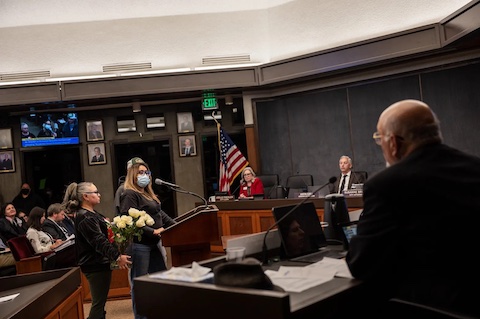
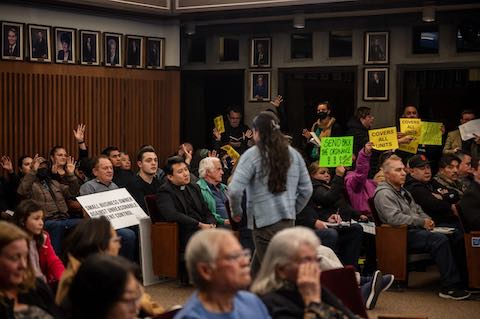
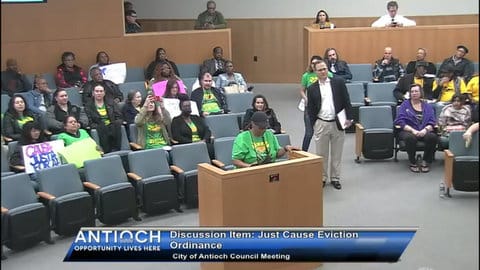
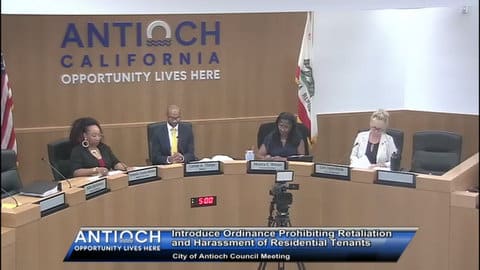
No Comments